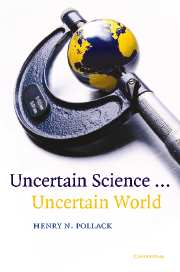Book contents
- Frontmatter
- Contents
- Acknowledgments
- About the author
- 1 Setting the stage
- 2 Uncertain about science
- 3 Can the media help?
- 4 Unfamiliarity breeds uncertainty
- 5 Fever or chill?
- 6 A fifty–fifty chance
- 7 I'm not quite sure how this works …
- 8 Let's see what happens if …
- 9 Reconstructing the past
- 10 Predicting the future
- 11 Out of the blue
- 12 In a climate of uncertainty
- Index
4 - Unfamiliarity breeds uncertainty
Published online by Cambridge University Press: 11 August 2009
- Frontmatter
- Contents
- Acknowledgments
- About the author
- 1 Setting the stage
- 2 Uncertain about science
- 3 Can the media help?
- 4 Unfamiliarity breeds uncertainty
- 5 Fever or chill?
- 6 A fifty–fifty chance
- 7 I'm not quite sure how this works …
- 8 Let's see what happens if …
- 9 Reconstructing the past
- 10 Predicting the future
- 11 Out of the blue
- 12 In a climate of uncertainty
- Index
Summary
Experience is a hard teacher because she gives the test first, the lesson afterward.
Vernon Sanders LawWhen we experience things in the course of our lives, we become familiar with them, perhaps understand them, and come to accept them as a normal part of life. But when we first encounter something that we have not previously experienced, something we are unfamiliar with, there is a natural tendency toward caution. And if we are presented with an abstraction, something totally outside of our experience, skepticism or even disbelief is not an unnatural reaction.
In this context, uncerainty goes hand in hand with unfamiliarity. What we are unfamiliar with, we are uncertain of. And much of science is unfamiliar ground for many people. Although Albert Einstein thought otherwise, science is really not just ‘common sense’. If it were, no one with a modicum of common sense would be puzzled or baffled by it. Science requires a certain amount of abstraction, and the placing of observations into a context or framework. When that framework is one's immediate environment, familiarity and understanding come readily. But when the spatial framework is much smaller, as in particle physics, or much larger as in astronomy, it takes a willing mind to explore this unfamiliar, uncertain terrain. Similarly, there are processes that operate at time scales vastly different from those of everyday human experience. The apparently instantaneous completion of a chemical reaction or the inordinately slow pace of geological change both require an intellectual stretch.
- Type
- Chapter
- Information
- Uncertain Science ... Uncertain World , pp. 43 - 62Publisher: Cambridge University PressPrint publication year: 2003



